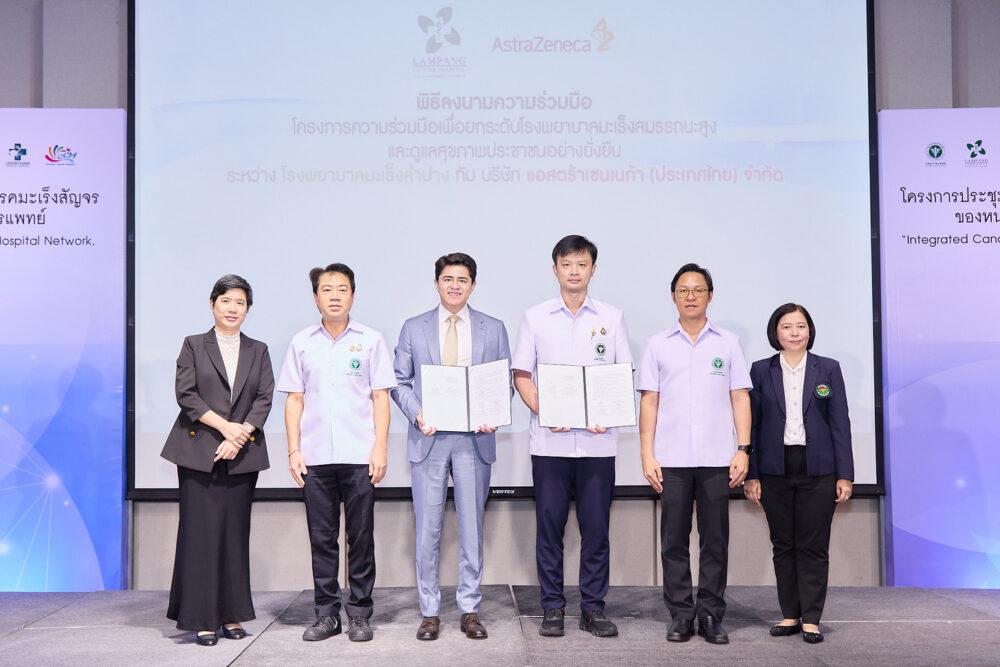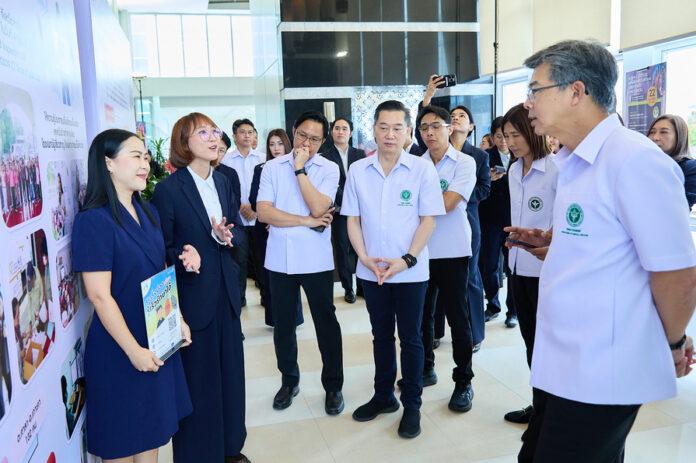Lampang Cancer Hospital and AstraZeneca (Thailand) Co., Ltd. announced a strategic collaboration to strengthen cancer treatment and patient care through the use of advanced medical technology and innovation. The collaboration aims to improve the efficiency of early-stage cancer screening and diagnosis, increasing the chances of long-term survival for patients. As part of the initiative, the two organizations have launched a pilot project to enhance lung cancer care, support international oncology research, and establish a comprehensive referral network to ensure timely and effective cancer treatment.
Dr. Taweesin Visanuyothin, Director-General of the Department of Medical Services, and Flt. Lt. (Dr.) Somchai Thanasitthichai, Director of the National Cancer Institute, presided over the signing ceremony of a Memorandum of Understanding (MoU) for the “Collaborative Project to Enhance High-Performance Cancer Hospitals and Promote Sustainable Public Health Care.” The MoU was signed by Dr. Rawin Ingsirorat, Director of Lampang Cancer Hospital, and Mr. Roman Ramos, President of AstraZeneca Thailand and Frontier Markets. This partnership aims to strengthen a comprehensive lung cancer care system, beginning with public awareness and early-stage screening, through the integration of advanced medical technology and innovation. It also focuses on developing an effective referral network and enhancing the capacity of multidisciplinary teams to ensure that patients receive timely and appropriate care aligned with international standards. The initiative is intended to serve as a model for establishing a national lung cancer care system. The announcement took place at the Doi Luang Meeting Room, Kantary Hills Hotel, Chiang Mai on July 22, 2025.
Dr. Taweesin Visanuyothin, Director-General of the Department of Medical Services, stated: “Cancer remains a critical public health challenge in Thailand, with over 140,000 new cases and approximately 83,000 deaths each year. The burden of cancer not only affects the quality of life of individuals and families but also poses significant economic and social challenges at the national level. In response, the Department of Medical Services is committed to integrating cancer care and advancing a high-quality service system that encompasses health promotion, disease prevention, early screening, accurate diagnosis, effective treatment, and patient rehabilitation. The goal is to reduce morbidity and mortality rates while improving the overall quality of life for patients. Through the use of medical technology and innovation, the collaboration between Lampang Cancer Hospital and AstraZeneca is a vital step forward in enhancing patient care and increasing survival outcomes. This initiative also contributes directly to the long-term sustainability of Thailand’s healthcare system, which remains a core mission of the Department of Medical Services.”
Flt. Lt. (Dr.) Somchai Thanasitthichai, Director of the National Cancer Institute, emphasized that cancer, a non-communicable disease (NCD), remains one of the leading causes of death in Thailand, with incidence rates continuing to rise. Alarming trends show an increasing number of cases among the younger population. “Through this collaboration, modern technology will be leveraged to improve cancer detection, from early-stage screening to accurate diagnosis and individualized treatment. This approach enables timely intervention, increases the likelihood of a complete cure or symptom control, and helps reduce cancer-related mortality. The initiative also focuses on developing specialized expertise for medical personnel and multidisciplinary teams, which will enhance the overall capacity of the healthcare system to deliver high-quality cancer care. This effort aligns with the mission of Lampang Cancer Hospital, the leading cancer care center in Northern Thailand, which provides patient-centered oncology services and promotes sustainable health for the population,” he said.
Dr. Rawin Ingsirorat, Director of Lampang Cancer Hospital, explained that the collaboration with AstraZeneca represents a significant step forward in improving cancer care for patients in Thailand. “By integrating modern technology and medical innovation, this partnership reinforces the hospital’s vision of establishing a high-performance cancer center, enhancing its capacity to screen for cancer at early stages and deliver personalized treatment tailored to each patient. These efforts are expected to improve survival rates and enhance patients’ overall quality of life. At the same time, the initiative aims to raise public awareness about the importance of early cancer screening, which increases the chance of a complete cure or effective symptom control.
Early detection enables timely, targeted treatment planning, ultimately benefiting cancer patients nationwide and contributing to the long-term efficiency and sustainability of Thailand’s healthcare system,” he said.
Mr. Roman Ramos, President of AstraZeneca Thailand and Frontier Markets, said, “The company is honored to collaborate with Lampang Cancer Hospital to raise the standard of cancer care in Thailand and improve the quality of life for patients. Our partnership is focused on increasing public awareness about the importance of early cancer screening and supporting the integration of advanced technologies, particularly artificial intelligence-assisted chest X-ray (AI-assisted CXR) technology, to enhance the accuracy and confidence of medical personnel in detecting lung cancer at earlier stages. This collaboration is expected not only to improve survival outcomes for lung cancer patients but will also establish a strong foundation for developing evidence-based treatment guidelines that will contribute to the long-term sustainability of Thailand’s healthcare system.”
 Under the MoU, Lampang Cancer Hospital and AstraZeneca will collaborate to raise public awareness about the importance of cancer screening, early diagnosis, and timely treatment. The partnership also supports the integration of technology and innovation to enhance the efficiency of cancer care covering early screening, accurate diagnosis, and personalized treatment. This includes initiatives such as pilot projects for lung cancer patients, establishing a referral network for high-risk cases, and the advancement of international research collaborations.
Under the MoU, Lampang Cancer Hospital and AstraZeneca will collaborate to raise public awareness about the importance of cancer screening, early diagnosis, and timely treatment. The partnership also supports the integration of technology and innovation to enhance the efficiency of cancer care covering early screening, accurate diagnosis, and personalized treatment. This includes initiatives such as pilot projects for lung cancer patients, establishing a referral network for high-risk cases, and the advancement of international research collaborations.



